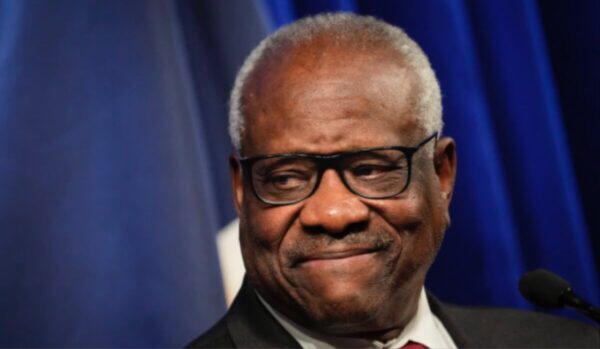Clarence Thomas’ Attorney Says Billionaire Bought His Mother’s Home After He Saw It Was In a ‘Dangerous’ Area Plagued with ‘Drug Users and Junkies,’ But Elderly Woman Still Lives There
The attorney for Supreme Court Justice Clarence Thomas said that a billionaire purchased his childhood residence after he saw it was in a “dangerous” neighborhood following his clients’ financial disclosure being made public this week.
The revelation was included in the Aug. 31 statement from lawyer Elliot S. Berke. The particulars and acknowledgment of the sale of the Savannah, Georgia, home — which his 94-year-old mother still abides in without paying rent — comes after an investigation from ProPublica and amid looming criticism about his ethics, which has led to calls for resignation.
Thomas’ response to the controversy has been scant. The statement from his attorneys is the most detailed rebuttal to all of ethics concerns so far, answering to a slew of allegations.
“In 2014, Harlan Crow, a longtime friend of Justice and Mrs. Thomas, visited Savannah with Justice Thomas,” Berke said, justifying the sale. “Mr. Crow witnessed firsthand how the neighborhood was blighted and dangerous with derelicts, drug users, and junkies, notably in the house next to the Justice’s mother and in the other houses on her street.”
Clarence told Crow that he plans to demolish the property when his mother dies. However, according to the statement, the billionaire suggested that he preserve the property for a museum — similar to his previous efforts to maintain landmarks connected to Clarence’s life. Berke noted that his client did not receive “any financial benefits” from those projects.
“With respect to the 2014 Savannah transaction, Mr. Crow bought the three parcels in which Justice Thomas had a one-third ownership interest for $133,000, along with the remaining houses/lots with numbers 540 to 550 on the same street,” the statement said. “Mr. Crow bought these other homes because he believed it would be beneficial to develop these properties to make this neighborhood more appealing – a mini urban renewal project.”
Berke added that Crow had the concept of building “a seed home with a good tenant” to revamp the neighborhood. It was built next to Thomas’ home, and a developer obtained the two additional properties. It’s currently unclear if the community has improved. Berke emphasized that Thomas did not profit from the sale.
“There was no profit or net income for Justice Thomas on the transaction—indeed, he lost money on the ultimate sale of the property — but the purchasers and subsequent owners/investors appear to have done very well financially,” he said.
Over the last few months, ProPublica’s reporting revealed that Crow paid the school tuition for one of Thomas’ relatives and gave him gifts and luxurious trips for decades. In addition, reports exposed that Thomas’ other billionaire friends showered him with at least 38 extravagant vacations and more than two dozen private flights.
Berke also pointed out that while other Supreme Court justices had been “accused of ethics infractions,” Thomas seems to have been singled out for political antics by left-wing groups.
“We look forward to answering any additional questions or addressing any remaining issues with it and its staff in the wake of these sensationalized allegations,” the statement says. “The financial disclosure process should never be weaponized against any Justice simply because any organization or anyone disagrees with the way a Justice thinks, writes, or votes.:

